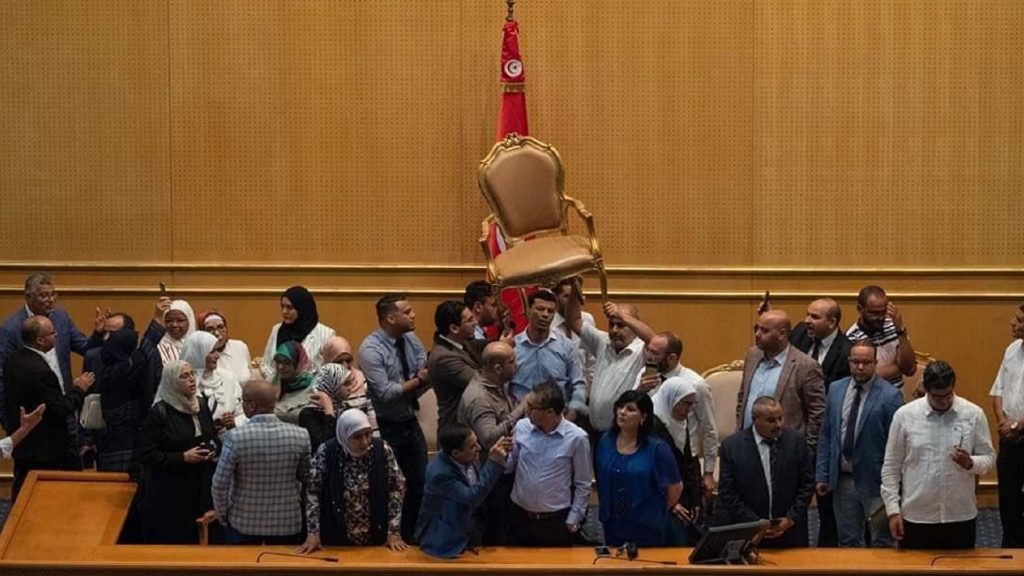The concept of hate speech is a difficult concept to explain. We can adopt some definitions in circulation, including “any speech includes an attack, incitement, defamation or pestilence by a person or group of people due to their difference from the majority and has a distinctive characteristic such as race, religion, gender, disability, political opinion, social class, gender identity, etc., as it embodies hatred within societies”. In another definition, we find that it is a group of different types of public expression that spread, incite, promote, or justify hatred, discrimination, or hostility against a person or group, based on who they are, in other words, based on religion, ethnic origin, nationality or Color, parentage, gender, or other identity factors.”
This discourse has become at the forefront of the Tunisian scene in all its aspects, whereby incitement to violence and crime against marginalized groups, including religious minorities, has become an almost daily act. Although some methods may not incite violence directly, they nonetheless reinforce the phenomena of intolerance and extremism that lead to the legitimization of religious acts of hate. It becomes more dangerous when the legal legislator or constitutional founder in the country is the main source of this discourse, its defense, and justification for its crimes, whether it is inside or outside, bypassing its primary role in protecting the security and social peace and respecting state institutions and laws.
Hate Speech in Social Media
Today, social media is considered the most effective way to help the promoters of hate speech to spread their messages and ideas, which are usually sharp and tend to advocate the use of violence as a means to deter violators or who consider them a reason for spreading deviant ideas that are alien to the culture of the Tunisian society, which in their view is characterized as a Muslim and conservative society.
It is very noticeable that some clerics affiliated with the radical Islamic trend in Tunisia represent a fundamental element in promoting hate speech, especially as they play on the emotional chord of people to charge them against each other and use religion as a means to justify hostilities and incitement to violence and hatred, which is usually based on elements that contribute to deepening this discourse, such as if the speaker is influential and has many followers or sympathizers, which helps him to reach the largest possible segment of people by publishing Facebook posts, data or videos that are widely circulated. This facilitates the process of integrating minds, which is spread more among the religious, cultural, and intellectual fragile groups, and these factors allow this inflammatory discourse to penetrate among people, to generate supporters, supporters, and defenders of it and its companions.
Hate speech from within the highest legislative authority
The Assembly of the Representatives of the People, in its new parliamentary session for the year 2019, has become a source for spreading hate speech and incitement to violence, especially with the rise of extremist currents from different intellectual and political streams that adopt populist and emotional discourse. The Assembly of Representatives witnessed several violent statements by some of its members that contradict the principles of the constitution and explicitly violate the laws. Among the most prominent events that were considered dangerous is the incident of the killing of the French professor who displayed caricatures of the Messenger of Islam Muhammad (PBUH). Many national parties and organizations condemned this terrorist operation, but MP Rashed El-Khayari wrote on his Facebook account the following: “Insulting the Prophet is the greatest crime, and whoever commits it must bear its consequences, be it a state, group or individual.” In the face of the uproar caused by his post, which was accompanied by an investigation that was opened by the Public Prosecution on the meaning of Article 31 of the Terrorism Law, which criminalizes any form of support or glorification of terrorism and terrorists, and during the great indignation of his post, the same MP published another post that was considered a flagrant challenge to the law and the constitution, and it included the following: “I may waive my immunity and leave parliament, but I will not waive my conviction for the crime of insulting the Prophet, Muhammad, may God bless him and grant him peace, and Mohamed is the Messenger of God, more important and greater than glory, parliament, politics and the whole world.” Many human rights defenders and politicians have called for his immunity to be withdrawn and for him to be tried on charges of glorifying terrorism and encouraging violence based on religion.
In his intervention on Tuesday, March 3, 2020, the plenary session in Parliament, MP Mohamed al-Afas expressed his indifference to the constitution that criminalizes accusations of apostasy, as he spoke about it with great ease, saying “We should not be ashamed of the accusing others of apostasy, as it is a Sharia’ ruling, so why to condemn it?” The second deputy speaker interrupted him, reminding him that his speech was outside the framework of the session, while many MPs, including Abier Moussi, head of the Free Constitutional Party bloc, considered that this intervention was really outside the framework, to the point of verbal altercation and clash between the constitutional representatives and the Islamists.



